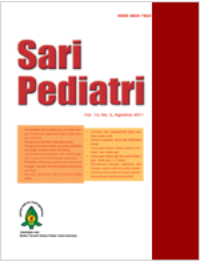Perkembangan Otak dan Kognitif Anak: Peran Penting Sistem Imun pada Usia Dini
Sari
Kata Kunci
Teks Lengkap:
PDFReferensi
Spichak S, Dinan TG, Cryan JF. Gut–neuroimmune interactions: the unexpected role of the immune system in brain development. Biochem (Lond) 2019;41:36-41.
Morimoto K, Nakajima K. Role of the Immune System in the Development of the Central Nervous System. Front Neurosci 2019;13:916.
de Graaf-Peters VB, Hadders-Algra M. Ontogeny of the human central nervous system: What is happening when?. Early Hum Dev 2006;82:257-66
Andersen SL. Trajectories of brain development: point of vulnerability or window of opportunity?. Neurosci Biobehav Rev 2003;27:3-18.
Simon AK, Hollander GA, McMichael A. Evolution of the immune system in humans from infancy to old age. Proc R Soc B 2015;282: 20143085.
Dowling DJ, Levy O. Ontogeny of Early Life Immunity. Trends Immunol 2014;35: 299-310.
Estes ML, McAllister AK. Maternal immune activation: Implications for neuropsychiatric disorders. Science 2016;353:772-7.
Dantzer R. Neuroimmune interactions: from the brain to the immune system and vice versa. Physiol Rev 2018;98:477-504.
Pacheco R, Contreras F, Prado C. Cells, molecules and mechanisms involved in the neuro-immune interaction. Dalam: Gowder, penyunting. Cell Interaction, InTech. Europe, Croatia, 2012.h.139-66.
Korin B, Ben-Shaanan TL, Schiller M, dkk. High-dimensional, single-cell characterization of the brain’s immune compartment. Nat Neurosci 2017;20:1300-9.
Ren K, Dubner R. Interactions between the immune and nervous systems in pain. Nat Med 2010;16:1267-76.
Goshen I, Kreisel T, Ounallah-Saad H, dkk. A dual role for interleukin-1 in hippocampal-dependent memory processes. Psychoneuroendocrinol 2007;32:1106-15.
Besedovsky HO, del Rey A. Central and peripheral cytokines mediate immunebrain connectivity. Neurochem Res 2011;36:1-6.
Stellwagen D, Malenka RC. Synaptic scaling mediated by glial TNF-alpha. Nature 2006;440:1054-59.
Nishide M, Kumanogoh A. The role of semaphorins in immune responses and autoimmune rheumatic diseases. Nat Rev Rheumatol 2018;14:19-31.
Meldrum SJ, D’Vaz N, Dunstan JA, dkk. Allergic disease in the first year of life is associated with differences in subsequent neurodevelopment and behaviour. Early Hum Dev 2012;88:567-73.
Julvez J, Torrent M, Guxens M, Antó JM, Guerra S, Sunyer J. Neuropsychologic status at the age 4 years and atopy in a population-based birth cohort. Allergy 2009; 64:1279-85.
Hung TH, Chen VCH, Yang YH, dkk. Association between enterovirus infection and speech and language impairments: A nationwide population-based study. Res Dev Disabil 2018;77:76-86.
Tsai CS, Chen VCH, Yang YH, dkk. The association between mycoplasma pneumoniae infection and speech and language impairment: A nationwide population-based study in Taiwan. PLoS ONE 2017;12: e0180402.
Lowenthal ED, Marukutira T, Tshume O, Chapman J, Anabwani GM, Gross R. Prediction of HIV Virologic Failure among adolescents using the pediatric symptom checklist. AIDS Behav 2015;19:2044-8.
Bilbo SD, Schwarz JM. The immune system and developmental programming of brain and behavior. Front Neuroendocrinol 2012;33:267-86.
Spann MN, Monk C, Scheinost D, Peterson BS. Maternal immune activation during the third trimester is associated with neonatal functional connectivity of the salience network and fetal to toddler behavior. J Neurosci 2018;38:2877-86.
Goines PE, Croen LA, Braunschweig D, dkk. Increased midgestational IFN-g, IL-4 and IL-5 in women bearing a child with autism: A case-control study. Molecular Autism 2011;2:1-11.
O’Shea TM, Joseph RM, Kuban KCK, dkk. Elevated blood levels of inflammation-related proteins are associated with an attention problem at age 24 months in extremely preterm infants. Pediatr Res 2014;75:781-7.
Leviton A, Allreda EN, Fichorovab RN, Kubanc K, O’Shead TM, Dammanne O. Systemic inflammation on postnatal days 21 and 28 and indicators of brain dysfunction 2 years later among children born before the 28th week of gestation. Early Hum Dev 2016;93:25-32.
Kuban KCK, Joseph RM, O’Shea TM, dkk. Circulating Inflammatory-associated proteins in the first month of life and cognitive impairment at age 10 years in children born extremely preterm. J Pediatr 2017;180:116-23.
Jiang NM, Tofail F, Moonah SN, dkk. Febrile illness and pro-inflammatory cytokines are associated with lower neurodevelopmental scores in Bangladeshi infants living in poverty. BMC Pediatr 2014;14:1-9.
Jiang NM, Tofail F, Ma JZ, dkk. Early life inflammation and neurodevelopmental outcome in Bangladeshi infants growing up in adversity. Am J Trop Med Hyg 2017;97:974-9.
Khandaker GM, Dalman C, Kappelmann N, dkk. Association of childhood infection with IQ and adult nonaffective psychosis in Swedish Men a population-based longitudinal cohort and co-relative study. JAMA Psychiatry 2018;75:356-62.
Wang HX, Wang YP. Gut microbiota-brain axis. Chin Med J 2016;129:2373-80.
Wang Y, Kasper LH. The role of microbiome in central nervous system disorders. Brain Behav Immun 2014;38:1-12.
Isolauri E, Partty A, Kalliomki M, Endo A, Salminen S. Early gut microbiota composition-a possible target to reduce the risk of developing neuropsychiatric disorders? FASEB J 2014;28:Supp 637.611.
Carlson AL, Xia K, Azcarate-Peril MA, dkk. Infant gut microbiome associated with cognitive development. Biol Psychiatry 2018;83:148-59.
Cionci NB, Baffoni L, Gaggìa F, Di Gioia D. Therapeutic microbiology: the role of bifidobacterium breve as food supplement for the prevention/treatment of paediatric diseases. Nutrients 2018;10:1723.
Wong CB, Iwabuchi N, Xiao J. Exploring the science behind bifidobacterium breve M-16V in infant health. Nutrients 2019;11:1724.
Patole S, Keil AD, Chang A, dkk. Effect of bifidobacterium breve M-16V supplementation on fecal bifidobacteria in preterm neonates-a randomised double blind placebo controlled trial. PLoS ONE 2014;9:e89511.
Li Y, Shimizu T, Hosaka A, Kaneko N, Ohtsuka Y, Yamashiro Y. Effects of bifidobacterium breve supplementation on intestinal flora of low birth weight infants. Pediatr Int 2004;46:509-15.
Del Giudice MM, Indolfi C, Capasso M, Maiello N, Decimo F, Ciprandi G. Bifidobacterium mixture (B longum BB536, B infantis M-63, B breve M-16V) treatment in children with seasonal allergic rhinitis and intermittent asthma. Ital J Pediatr 2017;43:25.
Van der Aa LB, Van Aalderen WMC, Heymans HAS, dkk. Synbiotics prevent asthma-like symptoms in infants with atopic dermatitis. Allergy 2011;66:170-7.
Sakurai T, Odamaki T, Xiao J. Production of indole-3-lactic acid by bifidobacterium strains isolated fromhuman infants. Microorganisms 2019;7:340.
DOI: http://dx.doi.org/10.14238/sp23.4.2021.279-84
Refbacks
- Saat ini tidak ada refbacks.
##submission.copyrightStatement##
##submission.license.cc.by-nc-sa4.footer##
Email: editorial [at] saripediatri.org


Sari Pediatri diterbitkan oleh Badan Penerbit Ikatan Dokter Anak Indonesia
Ciptaan disebarluaskan di bawah Lisensi Creative Commons Atribusi-NonKomersial-BerbagiSerupa 4.0 Internasional.





